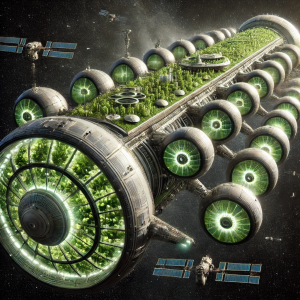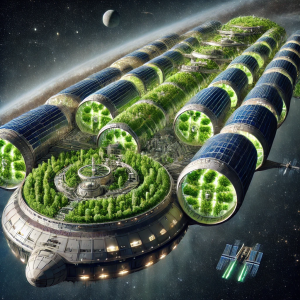Verdant-Class Agricultural Ship: Difference between revisions
(Created page with "== Verdant-Class Agricultural Ship == The Verdant-Class is a marvel of agricultural and environmental engineering, designed as a mobile ecosystem capable of producing large quantities of food, bio-resources, and medicinal plants. Utilizing advanced solar energy conversion and hydroponic systems, these ships maintain a closed-loop ecosystem, recycling water, air, and nutrients to create a sustainable farming environment in space. Equipped with both interior and exterior a...") |
No edit summary |
||
| (One intermediate revision by the same user not shown) | |||
| Line 1: | Line 1: | ||
== Verdant-Class Agricultural Ship == | == Verdant-Class Agricultural Ship == | ||
[[File:Verdant-Class.png|alt=Verdant-Class|thumb|Verdant-Class]] | |||
The Verdant-Class is a marvel of agricultural and environmental engineering, designed as a mobile ecosystem capable of producing large quantities of food, bio-resources, and medicinal plants. Utilizing advanced solar energy conversion and hydroponic systems, these ships maintain a closed-loop ecosystem, recycling water, air, and nutrients to create a sustainable farming environment in space. Equipped with both interior and exterior agricultural modules, the Verdant-Class provides a solution for food security and resource independence across interstellar settlements. | The Verdant-Class is a marvel of agricultural and environmental engineering, designed as a mobile ecosystem capable of producing large quantities of food, bio-resources, and medicinal plants. Utilizing advanced solar energy conversion and hydroponic systems, these ships maintain a closed-loop ecosystem, recycling water, air, and nutrients to create a sustainable farming environment in space. Equipped with both interior and exterior agricultural modules, the Verdant-Class provides a solution for food security and resource independence across interstellar settlements. | ||
| Line 27: | Line 28: | ||
== Key Features == | == Key Features == | ||
- Self-Sustaining Ecosystem: Verdant-Class ships maintain a stable, closed-loop ecosystem that recycles water, air, and nutrients, ideal for long-term missions. | [[File:Verdant-Class2.png|alt=Verdant-Class *another view)|left|thumb|Another view of the Verdant-Class]] | ||
Self-Sustaining Ecosystem: Verdant-Class ships maintain a stable, closed-loop ecosystem that recycles water, air, and nutrients, ideal for long-term missions. | |||
* Mobile Gene Bank: Equipped with gene storage and bio-sample vaults to preserve rare plant genetics for future generations. | * Mobile Gene Bank: Equipped with gene storage and bio-sample vaults to preserve rare plant genetics for future generations. | ||
Latest revision as of 21:04, 5 November 2024
Verdant-Class Agricultural Ship

The Verdant-Class is a marvel of agricultural and environmental engineering, designed as a mobile ecosystem capable of producing large quantities of food, bio-resources, and medicinal plants. Utilizing advanced solar energy conversion and hydroponic systems, these ships maintain a closed-loop ecosystem, recycling water, air, and nutrients to create a sustainable farming environment in space. Equipped with both interior and exterior agricultural modules, the Verdant-Class provides a solution for food security and resource independence across interstellar settlements.
Key Specifications
- Class: Verdant-Class Agricultural Ship
- Dimensions: 3-5 kilometers in length, with modular width for customizable crop space
- Power Source: Fusion reactors and solar radiation collectors, optimized for photosynthesis
- Crew Capacity: 100 to 500 agricultural specialists, engineers, and support staff
- Capacity: Produces sufficient food for 50,000 - 100,000 people, depending on crop yield and variety
Design and Structure
The Verdant-Class has a unique, layered design, consisting of cylindrical and ringed sections to maximize crop exposure to sunlight and artificial light sources. The ship’s design includes solar-optimized canopies and reflective panels to enhance natural light distribution throughout the farm decks, enabling continuous photosynthesis. Key structural features include:
- Solar Canopies: Retractable, solar-absorbing canopies cover the ship, funneling light to different agricultural zones.
- Hydroponic & Aeroponic Bays: Rows of controlled bays grow crops using minimal soil and water, instead employing nutrient-dense mists or water-rich hydroponic systems.
- Livestock & Aquatic Modules: Separate areas for livestock and fish provide a protein source, ensuring a balanced ecosystem.
- Eco-Regeneration Labs: Labs focusing on regenerative farming, seed preservation, and soil restoration, keeping biodiversity high and adaptive.
- Gravity Rings: Rotational sections create artificial gravity, aiding crop stability and growth efficiency in zero-G environments.
Solar Radiation Conversion
Verdant-Class ships utilize cutting-edge solar conversion technology to harness cosmic and solar radiation, converting it into energy usable for crop growth. This includes:
- Solar Panel Arrays: Massive arrays that capture and convert light into energy for artificial sunlight, water purification, and environmental controls.
- Etheric Photosynthesis Amplifiers: Through Ether Magic, Verdant-Class ships amplify the photosynthetic efficiency of crops, accelerating growth cycles and enhancing yields.
- Waste Conversion Reactors: Organic waste is processed into nutrient-rich fertilizer, sustaining a closed-loop system that minimizes resource depletion.
Key Features

Self-Sustaining Ecosystem: Verdant-Class ships maintain a stable, closed-loop ecosystem that recycles water, air, and nutrients, ideal for long-term missions.
- Mobile Gene Bank: Equipped with gene storage and bio-sample vaults to preserve rare plant genetics for future generations.
- Terraforming Capabilities: Advanced crop varieties developed on these ships can support terraforming efforts by acclimating plants to various planetary atmospheres.
- Medicinal Herb Farms: Specialized zones cultivate plants with medicinal properties, supplying crucial remedies to far-reaching starbases and colonies.
Cultural and Practical Significance
Verdant-Class ships are seen as essential to the success and autonomy of space-based societies. For isolated colonies, these ships symbolize life and continuity, providing the agricultural backbone needed for survival. They are often accompanied by agricultural experts who work in close collaboration with planetary botanists to integrate unique crops and bio-resources into diverse ecosystems.
In 7019, Verdant-Class ships are considered among the most vital classes of ships in operation, embodying humanity’s and allied species' commitment to survival, adaptation, and sustainable growth in the cosmos.
